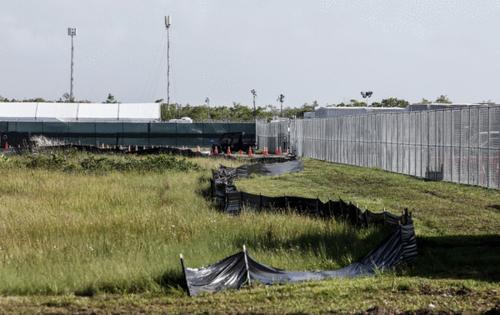Judge to rule within a week on whether to temporarily shutter Alligator Alcatraz
Published in News & Features
MIAMI — The fate of Alligator Alcatraz is now in the hands of a Miami federal judge who over the last four months sanctioned Florida’s Republican attorney general and blocked police from enforcing a new state immigration law.
U.S. District Judge Kathleen Williams said Wednesday following days of testimony about the environmental impacts of the Everglades immigration detention camp that she plans to rule no later than Aug. 21 on a request to temporarily shut it down.
Were she to side with the plaintiffs, it would be a significant blow to the Trump and DeSantis administrations, which have touted the hastily constructed detention center as a successful new tool in the president’s mass-deportation campaign.
Williams, an Obama appointee, is presiding over a lawsuit filed by Friends of the Everglades, the Center for Biological Diversity, Earthjustice and the Miccosukee Tribe alleging the federal government and the state dodged federal environmental regulations.
They say the DeSantis and Trump administrations ignored the National Environmental Policy Act, which requires environmental review for any “major” federal action.
Williams has already given the plaintiffs a small victory in the case.
As part of unexpectedly long multiple-day proceedings, Williams last week placed a restraining order on construction at the site until Aug. 21. She said Wednesday that she would issue her ruling on the proposed temporary injunction halting Alligator Alcatraz operations within that time frame.
An injunction would hold until a verdict is reached in the case, unless a government appeal on the ruling is successful. State lawyers said during the hearing they plan to appeal immediately if Williams issues an injunction.
In order for an injunction to go into place, the environmental groups and the Miccosukee Tribe have to prove there will be “irreparable harm” done to the environment around the site, plus a high likelihood that they will win the case. They also have to prove that damages to the ecosystem will outweigh any harm done to the government if the facility is shut down.
Lawyers from the Trump and DeSantis administrations have dismissed concerns about environmental damages. But they have also argued jurisdictional issues, saying NEPA doesn’t apply to Alligator Alcatraz because it is state-run and state-funded.
“A local plan does not become a major federal action upon federal approval,” said state lawyer Jesse Panuccio, citing case law.
The question of who runs the site — since immigration enforcement is a federal power — has hovered over the environmental lawsuit and puzzled immigration lawyers attempting to get access to their clients – the subject of another ongoing suit playing out in a courtroom across the hall from Williams’ chamber.
The government lawyers in both cases have argued that the state’s various federal agreements affording law enforcement immigration-enforcement powers give the state the authority to manage the site — though the Florida Division of Emergency Management, tasked with running it, does not have such an agreement.
The federal 287(g) program underpinning those agreements initiates a partnership, federal lawyers argued in the environmental case, but it doesn’t cede state control of its own facilities to the federal government. The state had full control over planning and executing the facility, and as now it has full control over managing it, state lawyers added.
Lawyers for the environmental advocacy groups and the Miccosukee have pointed out that 287(g) agreements authorize local and state law enforcement officers to operate “under the color of federal authority,” with the supervision of the U.S. Attorney General and Immigration and Customs Enforcement approval. They argue that makes Alligator Alcatraz a federal facility.
“The buck has to stop with ICE,” said Paul Schwiep, a lawyer representing the environmental groups in the case.
Williams also questioned federal and state lawyers about what level of harm it would do to close Alligator Alcatraz in particular. She agreed an additional immigration detention center relieves overcrowding at other facilities in Florida, but she pushed for answers on why a new facility had to be built in the midst of Big Cypress National Preserve, asking if the governments involved had considered any other options.
The federal and state lawyers said the remoteness of the facility was a factor, but Williams pointed out that other detention centers were within the bounds of cities.
“Why there?” Williams asked.
_____
©2025 Miami Herald. Visit miamiherald.com. Distributed by Tribune Content Agency, LLC.







Comments